In the world of celebrity, John Cleese occupies rarefied air: Living Legend.

Monty Python member. Fawlty Towers proprietor. Knight of the Round Table. Minister of Silly Walks. And sure enough, as moderator Stephanie Crugnola introduced him Saturday at 1PM in the Marriott Atrium Ballroom, he shambled on stage, looking a little lost before he sat and said, “That was my Joe Biden impersonation.”
For an hour, Cleese regaled Con goers with tales from his storied career. Appearing at his first Dragon Con, he received a standing ovation and then observed, “Well nobody’s able to tell me why it’s called Dragon Con. Are there a lot of dragons around?”
He delighted in answering fan questions, starting with detailing new projects. He’s currently adapting Life of Brian for the stage and grappling with a new ending since the impact of the 1988 film’s crucifixion doesn’t work as well in 2024. “I decided that I was gonna have Pontius Pilot apologize,” he said. “I thought he would say things like ‘Let’s face it, mistakes were made’.” Cue the laughter.
Cleese has also written a screenplay called Yummy that he describes as a “light comedy about cannibalism” with lots of black humor, making it something of a hard sell, in his opinion, as he’s been shopping it around for months. It has become the norm, particularly for comedies, to face an uphill battle in an industry reliant on numbers to predict and promote only money-making hits, which usually lack originality. Also, drama gets all the prestige despite comedy being the harder of the two genres.
Of course, his delivery of this information was unmatched—like watching a fresh standup set unfold in real time, which included gentle ribbing of Crugnola and expressing admiration for the ASL interpreters. But Cleese has had years of practice at being quick-witted and honing his observational humor. Monty Python formed in 1969 and, as one fan noted, ushered in a surrealist form of comedy that continues to influence. Yet, Cleese said the members of Python often questioned their own material.
“Normally, by the time you get to the point of actually shooting the movie, you’ve written it and rewritten it and rewritten it and rewritten it,” Cleese said. “And then you’ve rehearsed it, so by the time you get to it, you’ve heard all the jokes about twenty times before.” Because of this familiarity, it’s hard to get tickled by a joke. Still, listening to Michael Palin talk about “his big Roman friend, Biggus Dickus” in Life of Brian cracked Cleese up as did watching Palin as the wealthy landowner in Monty Python and the Holy Grail explain to guards played by Eric Idle and Graham Chapman why his son can’t leave.
“I wasn’t in the room for that because I would have ruined take after take,” Cleese said. “Funniest scene in the whole movie but on the whole, you’re just trying to get it done.”
When asked what it was like working with the Muppets, Cleese said “The best. Best experience I ever had.” He marveled at Jim Henson’s ability to bring an expressive creature to life with just finger movements. “I wish I could have worked with them all the time.”
As for the state of comedy, Cleese observed that “there’s less laughter now” generally.
“I think, first of all, people are more anxious because so many things are going wrong in the world and when people are anxious, they don’t laugh,” he said, while noting that “a perfect person who is wise, kind, generous, thoughtful—all the good things—isn’t funny. Would we like having a comedy about a functional family? What’s funny is when people are stupid, and lustful, and greedy. That’s what’s funny. We like Basil Fawlty or Archie Bunker or W.C. Fields. Its not because they’re perfect human beings. It’s because they were very imperfect human beings, so all humor is, in a way, critical.”
He then trolled the Irish and told a story of teasing a cab driver in Dublin, who teased him right back. “If you laugh with someone, then you bond with them,” he said. “[Comedy’s] actually a bonding mechanism. Provided that when you tease people, it’s done with humor and kindness. Nasty teasing is horrible.”
Cleese talked about how Life of Brian—now considered a classic comedy—struggled to get made, with studio after studio passing on funding it for $7 million. Yet, when it did get made, it made over $200 million. “The people in charge,” he said, “have no idea what they’re doing.”
“When we first started Monty Python,” he continued, “the critics didn’t say it was good or bad because they didn’t understand it. There’s was a strange silence.”
Yet, people latched on and have since been very loud about their love of the group. Of how he, and the other members, maintained their relationships, he said “you don’t always.” But, at some point “you sort of decide you like them again.” Parity amongst the Monty Python members contributed to its longevity because they valued the different skills everyone brought to the “team.”
And, yes, Cleese—while seasick—did twice vomit on a cameraman, which led to the creation of the “Cheese Shop” sketch after Python member Graham Chapman coined the phrase “medicinal cheese.” Cleese, for what it’s worth, is his own kind of medicine. Always bringing laughter to the world, then and now, when it needs it most.
